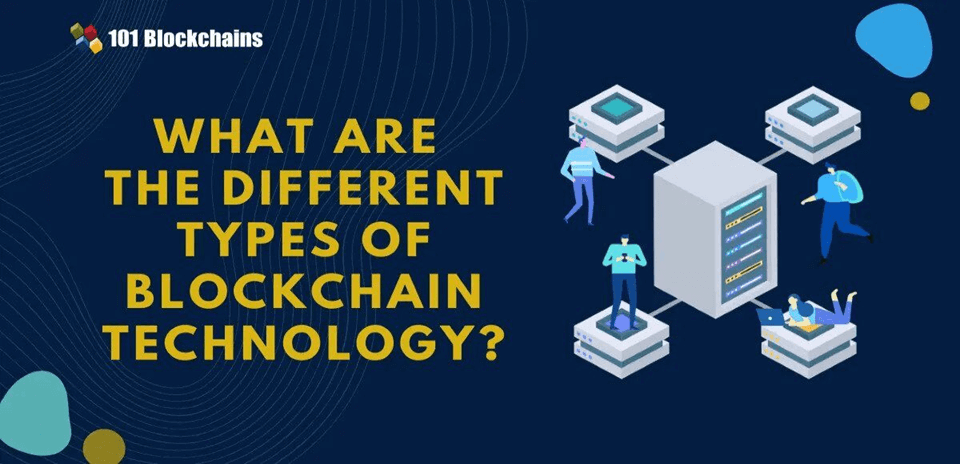Learn how blockchain truly works, master key definitions, and uncover what makes smart contracts so "smart." Dive into the fundamentals, gain valuable insights, and start your blockchain journey today!

- Reviews
101 Blockchains
- on August 13, 2018
Enterprise Blockchains: What Are They And How They Could Transform The Enterprise Landscape?
Enterprise blockchains are blockchain networks that are developed and integrated into enterprise systems and it is no doubt that they will be quite disruptive and transformative. In order to understand just how much enterprise blockchains stand to change the landscape, it is important to understand the features that the technology.
The growing interest in enterprise blockchain obviously means that more corporates are interested in understanding the technology so that they can create their own enterprise blockchain platforms. Blockchain is described as a digital ledger that records data but does not allow data to be altered. Additionally, it is decentralized in the sense that it works on a network of computers and blockchain is considered unhackable and it is also highly efficient. This means that it is the ideal technology for the enterprise market because it will allow companies to deploy more secure systems that will also achieve faster service delivery.
Unfortunately, most people still associate blockchain with cryptocurrency and they fail to recognize that the two are different. Blockchain is the technology on which cryptocurrencies are built and operated. However, the technology has a wide range of applications beyond the digital currency space.
The implementation of blockchain technology with enterprise systems
As pointed out earlier, the unique features of decentralized ledger technology make it an attractive option for the creation of enterprise blockchain platforms. The corporate sector seems to be quite interested in enterprise blockchain solutions that can help achieve more efficiency and such, some of them have started carrying out research on the technology.
The dawn of the blockchain age has been likened to the internet age where many companies came up promising to offer the best internet experience. In the case of blockchain technology, there has been a lot of startups that focus on the development of different solutions using the technology. The technology has also become so popular that major firms such as IBM have also been trying to secure a piece of the pie.
IBM has so far struck partnerships with hundreds of enterprises with the aim of exploring blockchain implementation. So far there are thousands of corporates that are testing the technology. The main reason why they are interested in Blockchain is so that they can exploit its capabilities to reduce fraud, enhance the security of their systems, improve their products, and to reduce the cost of transactions as well as the time that it takes for transactions to be verified and completed.
IBM has already launched an initiative called the IBM Blockchain Foundation for Developers which is aimed at sharpening the skills of developers. The foundation aims to spread the knowledge and skills that are necessary for the development of blockchain solutions.
Enterprise Blockchains use cases
There is a wide range of blockchain enterprise use cases and they keep expanding as the technology is introduced into different sectors. The application of enterprise blockchain solutions can be categorized as:
- Vertical specific applications
This refers to the use of blockchain for biometrics monitoring in health, Personal Health Record in the health industry, food provenance, and authenticity in health and safety, virtual clinical trials in the pharmaceutical and health industry. It also refers to the application of the technology in cross-border trades in finance, transaction settlement in the insurance and finance industry.
- Horizontal applications
This is the application of enterprise blockchain in areas such as process verification & audit, product provenance & authenticity, supply chain management, product life-cycle data store and system interoperability & data sharing.
Supply chain management and tracking
An example of a vertical specific application that is currently one of the Blockchain enterprise use cases being tested in the market to track produce such as meat or crops from the firm to the point they hit the shelves ready for consumers.
Freight and shipping
One of the well-known Blockchain enterprise use cases is the partnership between IBM and the Maersk shipping firm to create a platform called TradeLens which is a global trade blockchain platform. As you would have guessed it, the partnership was developed to implemented blockchain technology into the shipping industry to achieve more efficiency.
The partnership has so far attracted more than 90 firms including logistics companies, customs authorities, port operators and even other ocean carrier firms. Additionally, IBM and Maersk have been working towards making sure that the platform will benefit other companies and as such, they made sure that it was an open ecosystem that will be accessible to other firms in the industry.
Cybersecurity
As pointed out earlier, one of the key characteristics of blockchain technology is its immutability, meaning data cannot be compromised or hacked. The technology can be used to guarantee the safety of data, especially in the enterprise landscape, thus protecting corporates from cyber-attacks.
The fintech industry
Other than facilitating the existence of digital currencies which might be the future of currency, blockchain technology might also help to bring significant improvements to the fintech industry. Enterprise Blockchain solutions can be used to significantly improve the processing of payments through transactions that are highly secure, fast and efficient. Cross-border remittance could become less complex and more efficient through blockchain technology.
The energy sector
Enterprise Blockchain solutions can be used to create the next generation of power systems and grid systems. This sector stands to benefit greatly from the adoption of such technology. Some of the ideas that have been brought forth pertaining to Bitcoin and the energy sector include smart utility metering and peer to peer transfer of energy.
Education
Enterprise blockchain can be used to create a digital system through which academic credentials can be verified. Suggested approaches include creating a platform that contains academic records pertaining to students, classes and their professors. Such a system would be hugely beneficial to companies when they are recruiting because it would simplify their job and also eliminate a lot of paperwork.
IoT
Blockchain technology could be the missing piece of the puzzle when it comes to bringing the Internet of Things into the mainstream and especially into the enterprise space. Blockchain enterprise solutions can be used to link transactional data to IoT applications.
The Media industry
With the rising popularity of blockchain technology, it would be no surprise if enterprise blockchain companies also venture into the use of the technology in the media industry. For example, they can come up with solutions that will enforce anti-piracy measures and control copyright ownership rights. Smart contracts can also be used to facilitate legal proceedings or even facilitate the compensation of artists.
The healthcare sector
Enterprise blockchain solutions might be highly useful in the healthcare industry in a number of ways. The technology can be used to create patient databases that will make the whole process much easier and secure. Blockchain can also be used to bring more integrity into drug supply chain management thus helping to reduce the millions of dollars that are lost annually.
Blockchain technology can also be used to incorporate more privacy, ownership, and efficiency of patient health data. It might also be a key solution towards improving medical supply chain management.
Enterprise blockchain companies
The massive and growing demand for blockchain solution has led to the creation of enterprise blockchain solutions that aim to provide those solutions. Here are some of the enterprise blockchain companies that are currently in the market.
- Applied Blockchain
This is a company that deals with the development of blockchain solutions particularly those that focus on smart contracts and decentralized ledger technologies (DLT). The firm is based in CanaryWharf, London and is part of the Level39 FinTech Accelerator. So far the company has developed a privacy framework and a blockchain agnostic application. These can be used on any blockchain platform to future-proof solutions, introduce workflow functionality and boost development efficiency.
- AlphaPoint Distributed Ledger Platform
This is a private enterprise blockchain company that seeks to take advantage of the benefits that blockchain technology has to offer. These include speedy clearing, strong cryptography, and immutability. ADLP is also uniquely different from traditional blockchain because it provides firms with the ability to have complete control over their data. Enterprise customers can deploy their financial applications using ADLP’s general purpose platform.
- BigchainDB
This company provides enterprises and developers with the ability to launch proofs-of-concept for blockchain networks as well as access to applications and platforms that feature a blockchain database that is scalable.
- Avalanchain
This is a blockchain company that provides clients with data-as-a-stream services. Enterprises can take advantage of Avalanchain’s blockchain solutions to come up with an unlimited number of chains. Additionally, each chain can be a separate chain of events that are signed digitally.
- Blockchain Foundry
This blockchain company is ideal especially for companies looking for an enterprise blockchain platform that will be secure, strong and scalable for production deployment and prototyping.
- Bloq
Bloq is one of the companies that provides leading global companies with enterprise-level blockchain technology. It develops vital software infrastructure that is deployed in blockchain applications.
- BlockCypher
This is a blockchain firm that focuses on delivering an enterprise-grade architecture that is cloud-optimized and modular. It also aims to provide a high degree of reliability and performance.
- Chain Reactor
This enterprise blockchain company is focused on delivering a platform for permissioned blockchains that offer high levels of performance. Some of its key features include support for NoSQL and SQL databases which means that Chain Reactor’s technology can be incorporated into already existing systems.
- ChainThat
This particular enterprise blockchain company focuses on supplying different industries with distributed products and applications that are based on enterprise blockchain solutions. The startup has a goal of delivering services and solutions that are geared towards improving peer-to-peer processing through the latest decentralized technologies. The overall objective is therefore to facilitate centralized processing that will allow better data quality, faster delivery, and cost savings.
- ChromaWay
This blockchain startup provides financial institutions with blockchain as a platform on which they can develop their solutions. The company also boasts of a platform that is based on smart contracts and is designed to make digitizing easier and also help companies to represent workflows in a private, secure and efficient manner. The platform is used on the bitcoin network to facilitate transactions.
- Epiphyte
This particular company deals with the finance sector by providing a SaaS service that is powered by blockchain to deliver instant delivery versus payment (DVP) and settlement for financial trades. The enterprise software developed by Epiphyte can be used by banks and other financial institutions to achieve secure integration with the crypto finance market.
These are just a few of the many blockchain enterprise companies that are currently in existence. Most of these companies have developed their solutions to focus on helping traditional companies to adopt blockchain and decentralized ledger technologies so that they can improve their businesses. More developments are expected to take place as Blockchain enterprise use cases continue to pop up.
How the blockchain movement is transforming the industry
As noted earlier, blockchain is one of the most promising and disruptive technologies to come up ever since the dawn of the internet age. As such, it has the capacity to usher in a whole new age that takes a different approach on how the tech and computer world operates. So far blockchain has proved to be quite transformative and that explains why many companies from different industries are interested.
Blockchain technology also happens to be very versatile in the sense that be adopted for enterprise use without having to create new organizational systems from the ground-up. This means deploying such technology will not be an expensive affair and this is also another reason why it is highly attractive. Thanks to Blockchain enterprise companies, there are solutions that enterprises and companies can use to achieve blockchain integration. This kind of support also highlights the existing demand for such services and as such, developers are reacting by creating companies to cater to that demand.
It is also important to note that enterprises will most likely adopt private blockchains and not public ones for quite an obvious reason. Public blockchains provide access to anyone and this would not be good for the corporate settings where things have to be handled in a closed environment. Private blockchains can be implemented such that only specific users are allowed access by an enterprise.
Allowing specific users is an attractive feature as far as security measures are concerned. Additionally, the technology can easily be implemented to provide more efficiency as far as access to data is concerned such as key details. It is important that firms select the best blockchain that suits their particular interests. For example, blockchains that support smart contracts are ideal for companies that mainly deal with systems designed to facilitate any form of contractual dealings.
Decentralized apps and smart contracts
Blockchain solutions that feature smart contracts are usually ideal for Decentralized apps (DApps). This is because DApps are designed to carry out transactions through smart contracts. As far as the future is concerned, blockchain technology will most likely be at the center of it and judging its growing popularity in different industries, it will most likely be a technology that is here to stay.
Private blockchains also mean that there will not be one blockchain but different versions of the technology. Additionally, the technology is constantly being worked on in order to improve it since it is still in its early stages. Chances are that blockchain technology the next five or 10 years will be far more advanced than it currently is.
There are some issues that have been raised over the past few years as blockchain gains popularity and some of those have led to the creation of other solutions. This is usually the case when it comes to the development of other technologies where improvements and upgrades are constantly made to overcome challenges or obstacles that show up along the way.
The adoption of blockchain technology for enterprise use also aligns with the government interest in the technology. Countries such as China have been quite welcoming to the idea of using blockchain enterprise solution and have offered a lot of support to the development of the technology.
Is enterprise blockchains going to replace cloud computing and already existing enterprise systems?
There has been speculation that blockchain technology will take over the role of existing systems in Enterprise blockchain platforms and perhaps even replace significant technologies such as cloud computing. However, that is not the case because blockchain is more like a technology that supplements those technologies and allows them to achieve their goals faster and more efficiently.
A good example is the use of blockchain technology to improve hospital systems where blockchain can be used to improve the patient data systems while still allowing the use of technologies such as artificial intelligence, cloud storage, and cloud computing.
Will enterprise blockchains become the center of corporate systems?
Many companies are currently trying out enterprise blockchain solutions and it is for the obvious reason that the technology has a lot to offer in terms of efficiency and speed. The technology has actually proved to be highly useful and successful especially in the cryptocurrency space and a few Enterprise blockchain platforms. Tests being run in other sectors outside the crypto realm have also demonstrated a lot of potential although mass adoption is yet to happen.
Blockchain has thus kicked off on a high note and the chances of it going mainstream are quite high at this point. As far as the timeline is concerned, there is no telling how long it will take before that happens but it is clear that the technology is appealing to many industries. This is good because it means that there is a higher chance that enterprise blockchain solutions will eventually be adopted by more industries.
The adoption of blockchain enterprise solutions will also usher in an era of highly disruptive business models. For example, blockchain technology eliminates the need for intermediaries thanks to smart contracts to achieve a trustless system that allows contracts to be made between parties. The execution of smart contracts in Enterprise blockchain platforms without intermediaries or third parties may threaten already existing business models and potentially lead to the loss of many jobs.
Blockchain education
As noted earlier, blockchain is still in its early stages of adoption and as such, there are still a lot of people that do not understand the technology. Blockchain education is thus important to make sure that the masses understand what it all about. This approach might help boost trust in the technology and therefore allow the adoption of blockchain enterprise solutions to have a bigger impact.
The involvement of big companies like IBM and Microsoft in enterprise blockchain development should also encourage the adoption of the technology. This is because such major corporations have already built up a strong corporate image and as such, they have earned the trust of the society. Their involvement in blockchain through Enterprise blockchain platforms might play a huge role in convincing more companies to jump on the enterprise blockchain companies bandwagon.
Microsoft is one of the companies that are well known for trying and developing new technologies and it is refreshing that the company has been keenon understanding and developing blockchain solutions.
Blockchain enterprise solutions might overshadow cryptocurrencies
So far blockchain technology has been popularized by the cryptocurrency market and this is why many people still cannot differentiate between the two despite their clear distinction. However, the rapidly growing popularity of enterprise blockchain in different industries could lead to massive adoption which means that this could end up becoming more popular than the use of blockchain for the crypto space. This does not mean that cryptocurrencies will become useless. In fact, there is no telling what the future holds but one way or the other; blockchain will most likely be at the center of that future.




